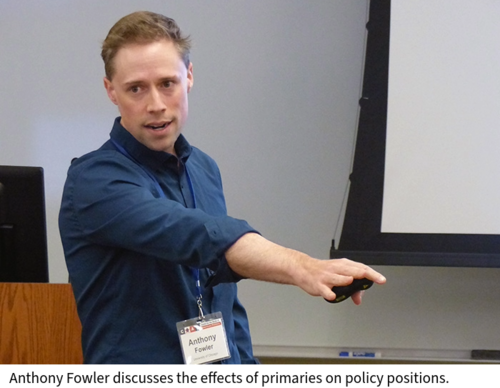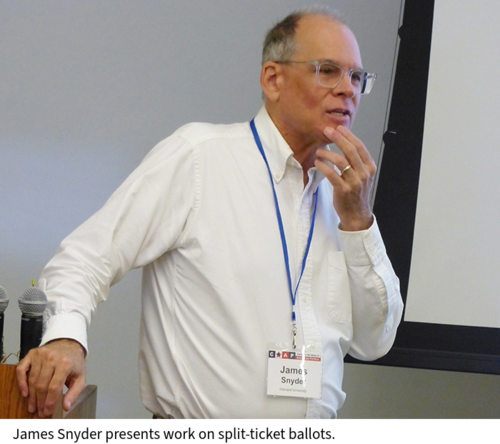What Crying, Criminal Records, and Split-Ticket Voting Reveal About U.S. Politics

If a politician cries about climate change, do we believe them? Or dismiss them as manipulative?
What happens to democracy when people with even minor criminal records no longer vote?
Are voters who split their tickets between candidates of different political parties confused? Or maybe they are the most discerning voters in America?
Earlier this month, the Institution for Social and Policy Studies’ Center for the Study of American Politics (CSAP) invited scholars to explore these questions and more as part of its annual conference.
“We launched this gathering 17 years ago to break down silos and foster meaningful, cross-cutting conversations among scholars of American politics,” said Gregory Huber, director of CSAP, chair of the Political Science Department, and Forst Family Professor of Political Science. “Here, researchers working through different methodologies on topics as diverse as bureaucracy, elections, criminal justice, and political behavior can learn from one another.”
Over the years have, papers presented at the CSAP summer workshop have later appeared in leading political science journals. The conference offers an opportunity to learn about work at the research frontier in an intimate setting for cultivating productive exchanges among scholars at different career stages.
“We come out of graduate school at different times, and we tend to know the people in our cohort but not always those who came before and after,” Huber said. “Here we can promote dialogue between overlapping generations to make political science more productive.”
ISPS advances interdisciplinary research in the social sciences that aims to shape public policy and inform democratic deliberation.
Over two days, presentations and discussions addressed how individuals — voters, legislators, or citizens — respond to signals in their environment.
Anthony Fowler, the Sydney A. Stein Jr. Professor at the University of Chicago’s Harris School of Public Policy, tackled a widely held belief in American politics: that primary elections push members of Congress to adopt more extreme positions. He asked if members would take more moderate positions if they did not have to worry about defeating a potentially more extreme primary opponent.
Fowler analyzed millions of roll call votes from 1995 to 2022, comparing the voting records of two members from the same party voting on the same bill but with different primary election dates (one has already passed, the other has not).

Fowler and his co-author found that after their primary election date passes, members are less likely to cast ideologically extreme votes. But the effect was very small: about a 0.2 percentage point decrease in extreme voting in the House and a 0.7 percentage point decrease in the Senate. He concluded that while primary elections do have an effect, it’s not large enough to explain the rise in polarization.
“If I could make everyone think less about primary competition, that would reduce the overall level of polarization in Congress by something like 1%,” he said, adding that he also found no evidence that members abstain from votes more strategically before primaries and no clear pattern of increase or decreasing effects over time. “Even among senators who are 90% likely to retire, we still find relatively modest effects.”
Talbot Andrews, assistant professor in Cornell’s Department of Government, shared her work arguing that emotions are not just internal states but communicative acts that can inform observers about the severity of a public risk and the sincerity of the speaker.
After conducting three experiments to gauge the effect of crying on perceptions of sincerity, appropriateness, and policy support, Andrews found that such emotional expression can be persuasive when the risk is perceived as severe, the speaker has been personally harmed, the risk is seen as uncontrollable, and the speaker is not seen as having ulterior motives. However, she found crying backfires when the risk is seen as preventable.
“Imagine someone crying about climate change,” Andrews said. “You might think this must be serious, or you might think they’re just trying to manipulate you. The takeaway is not that people should keep their feelings to themselves, but that such expression won’t be universally persuasive.”
James Snyder, the Leroy B. Williams Professor of History and Political Science at Harvard University, presented work he and his colleagues have conducted to understand more about swing voters. In particular, he discussed weak partisans, independents, and moderates who split their tickets between candidates of different parties within an election.
Snyder and his team analyzed over 50 million cast vote records from the 2020 election showing how individual voters chose candidates across races, from president to sheriff to ballot initiatives. They found 23% of voters split their ticket in some way, centrist voters split more often than non-centrist voters and often follow partisan cues, and voters respond to cues including incumbency and endorsements that indicate a broad consensus among voters.
For example, Snyder said that in a Texas sheriff race where the Republican incumbent was under criminal indictment, 13% of strong Republican voters defected away from the incumbent. And weak partisans shifted by 25 percentage points toward the Democratic challenger.
Snyder said that such swing voters are a minority — perhaps 5 to 10% of the electorate. But they are often decisive in close races.
“We’re not talking about tons of people here,” he said. “But they are consistently moving in the direction of the better candidate. Maybe something about democracy is working well.”
Other presenters focused on whether bureaucracies, courts, legislatures, and elections reproduce or mitigate inequality.

Elisa Wirsching, a postdoctoral fellow at Princeton University’s Center for the Study of Democratic Politics, presented her work on why urban bureaucracies — especially police departments — are politically and racially unrepresentative of the populations they serve.
Using a novel dataset of over 300,000 municipal employees in New York City merged with voter registration records, she showed that Republicans are 50% more likely to be hired than Democrats, and white applicants are 20% more likely to be hired than non-white applicants. These disparities persist even after controlling for test scores and qualifications because of a year-long gauntlet of background checks, unpaid training, and bureaucratic hurdles.
“The longer and more complex the hiring process, the more it filters out underrepresented groups,” Wirsching said. “We often think of exams as neutral, but the real action is in what happens after the test.”
Jacob Harris, a Ph.D. student at Cornell University’s Department of Government, discussed his research showing how misdemeanor convictions — despite not removing voting rights — depress turnout for years.
Analyzing 123,000 court records from Tampa, Fla., he found a misdemeanor conviction reduces turnout by 7.2 percentage points, an effect strongest among first-time offenders and habitual voters that persists for at least three election cycles.
“It’s not just about losing the right to vote,” Harris said. “It’s about losing the belief that you belong in the electorate.”
Leah Rosenstiel, assistant professor of political science at Vanderbilt University, explored a puzzle in American politics: If policymaking regularly shows bias to benefit the wealthy, why do so many federal assistance programs benefit the poor?
In the early stages of a project, Rosenstiel focused on a time of explosive growth in such programs between 1955 and 1972. She has found that members of the U.S. House of Representatives from poorer districts proposed more poverty-targeted programs but that senators from wealthier states were more likely to propose such programs. She suggested that southern Democrats used their committee power to shape eligibility rules, not just funding levels, to direct resources to their constituents.
“The War on Poverty was not just about liberalism — it was about southern Democrats channeling resources to their districts,” she said. “Who gets what from the federal government is not just about how much — it’s about who qualifies.”